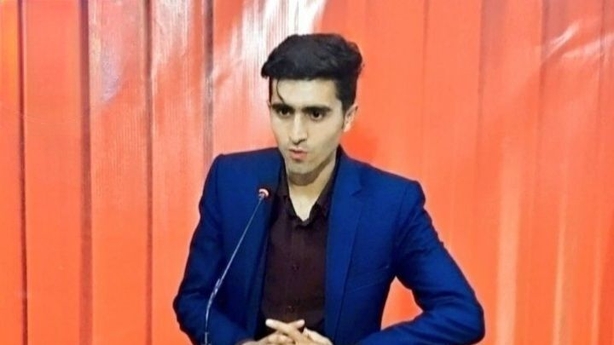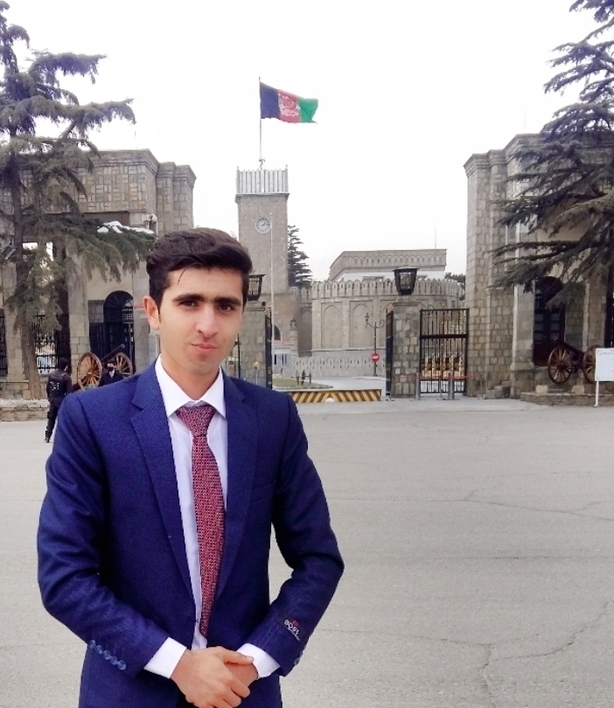Khwaja Lutfullah Sediqi described 15 August, 2021 as "a black day" in his life and in the lives of the Afghan people, "especially the young generation".
Lutfullah, as most people call him, was two weeks shy of his 20th birthday when the Taliban took control of Kabul two years ago.
In the days that followed he took to Twitter to document events as they unfolded.
His video from 16 August, 2021 showing chaotic scenes in Kabul as crowds headed for the capital's airport was picked up by a number of news organisations.
Three weeks later he posted footage of people crouching down amid the unmistakable sound of gunfire in the background.
The caption reads: "Video shows the Taliban firing into the protesters in Kabul today."
"I'm behind this person, I'm making the video," Lutfullah told me as he pointed to the screen of the people huddled together as shots ring out.
Another video, also dated 7 September, shows members of the Taliban firing their guns in the air in Kabul's Zanbaq Square where a protest had been taking place.
"Zanbaq Square is a most famous square in Kabul, it's like the Spire here," he explained, as we sat on a bench on the Liffey Boardwalk watching the videos.
When I asked him why he took such risks filming and posting these videos, Lutfullah replied that "people need to know the situation of Afghanistan and as a youngster this is my responsibility to show the reality of Afghanistan to all of the world".
Before the return of the Taliban, Lutfullah was a youth activist.

He said it all began with a local organisation, the Chakari Youth Association.
In January 2021, it described him as a "leading political and social activist" in his region.
From there he went on to join Kabul's Youth High Council.
Scrolling through his Twitter feed you can see that he has long been outspoken about human rights, women's rights, and in particular their right to access education.
However, he believed that being so outspoken put him at risk from the Taliban and their supporters and he made the decision to leave his country, and in so doing, his family.
"My family knew if I stayed inside Afghanistan it would cause a lot of difficulties for me, for my family, even for my relatives as well," Lutfullah said.
He is their eldest boy and he said that there were "a lot of tears" when he left.
"No one wants to leave his family," he said.
Afghan citizens are now the third highest nationality grouping seeking asylum in Ireland.
This year to the end of July, 530 Afghans applied for international protection here.
Lutfullah was one of them.
He is also one of the hundreds who spent weeks sleeping rough on the streets of Dublin amid a shortage of accommodation for newly arrived international protection applicants earlier this year.
"We tried to find shelter, because that time when we were coming here it was winter and (there was) a lot of rain and it was difficult to stay without shelter," he explained.
"Some days we slept in front of the IPO (International Protection Office) because it was a good area, after that (we slept in) some in parks and also bus stations," he said, and sometimes he said he was able to stay in the Islamic Cultural Centre.
"It was very hard but fortunately it has passed," he said.

Lutfullah is now living in emergency accommodation for international protection applicants at Kilbride Army Barracks in Co Wicklow.
He has started learning English and he has signed up for a number of volunteering projects "like cleaning the beach, like cleaning the city," he told me.
But while he is keen to start a new chapter of his life here in Ireland, the people he left behind in Afghanistan are never far from his mind.
Edicts issued by the Taliban mean that girls and women in Afghanistan today are denied education beyond primary level, banned from working outside the home in most sectors, prohibited from accessing public baths, parks, and gyms, and from moving freely around the country.
"When I talk to my sisters, I always tell them to stay positive, to stay strong, try to study some books," he said, but he admitted that he is worried about their futures.
It is because of them and others suffering under Taliban rule that Lutfullah said he will continue to speak out against restricted rights and freedoms in his home country.
"Back in my home in Afghanistan, there are lots of people, they need me to raise my voice for them," he said.






